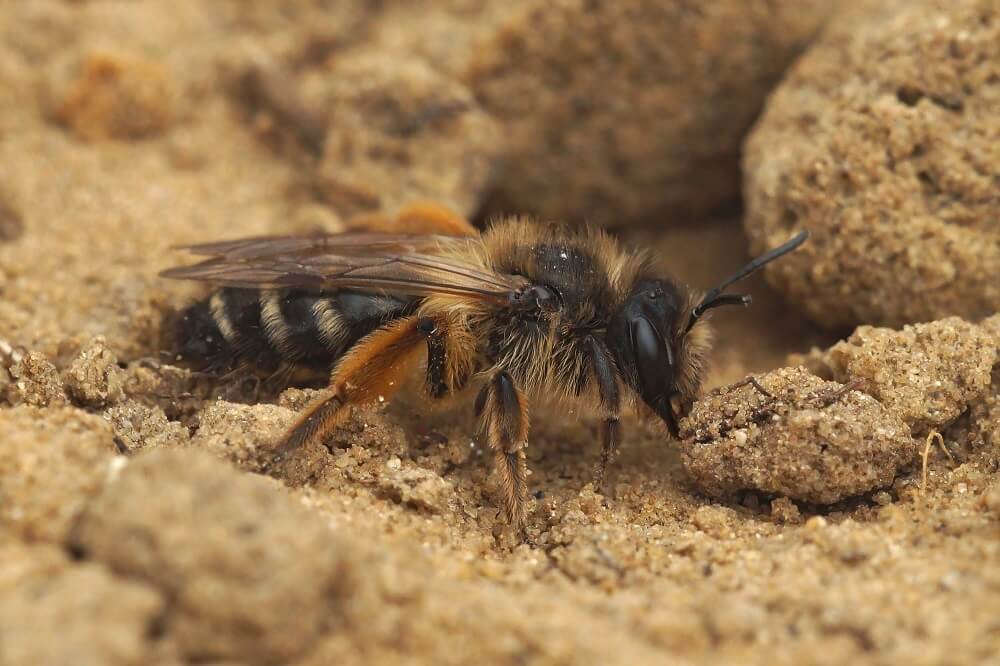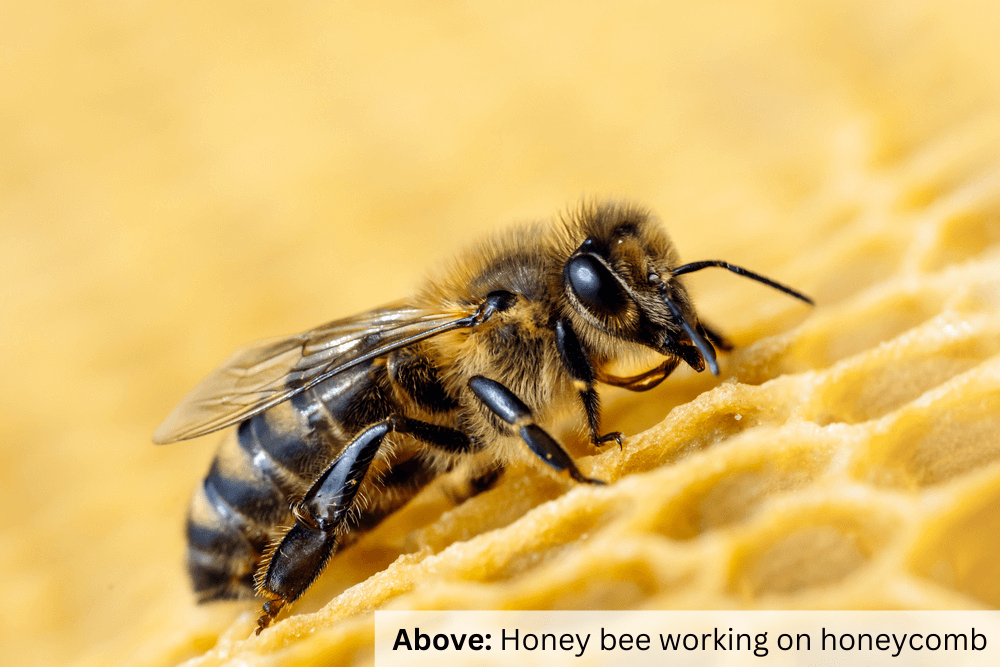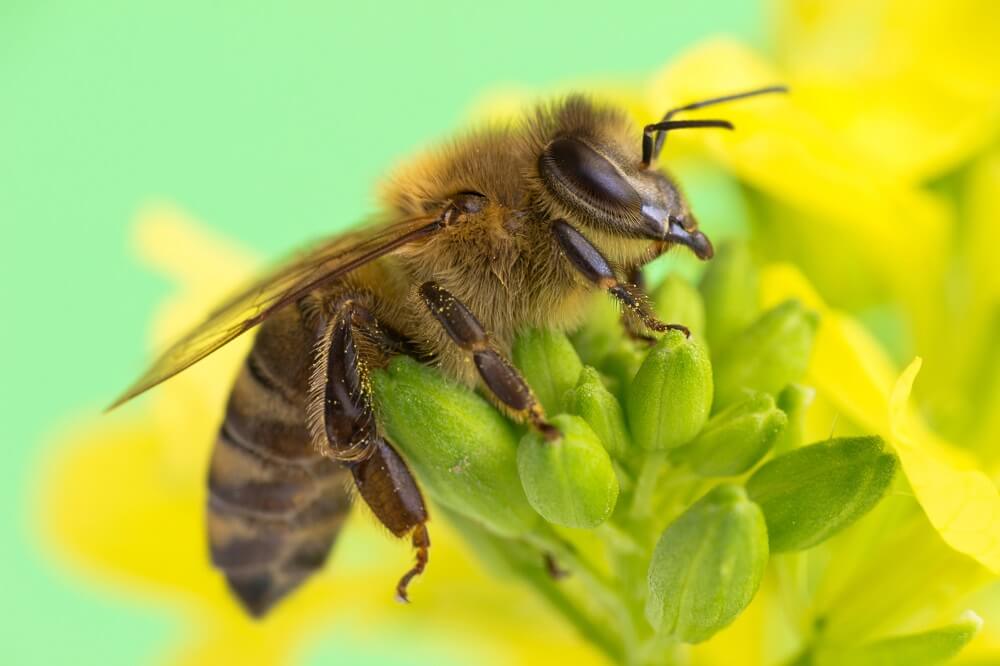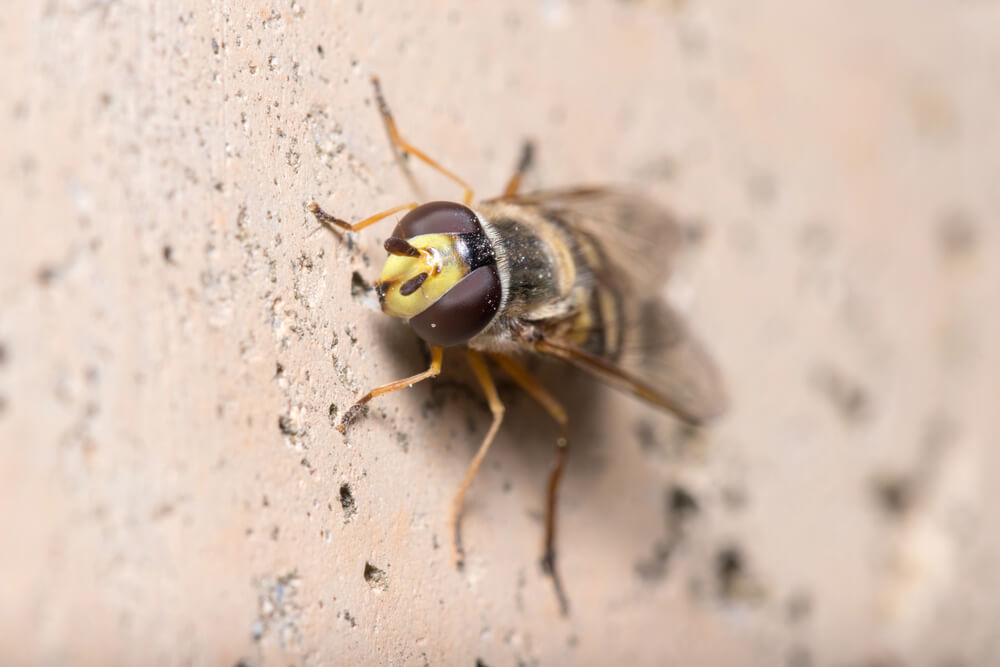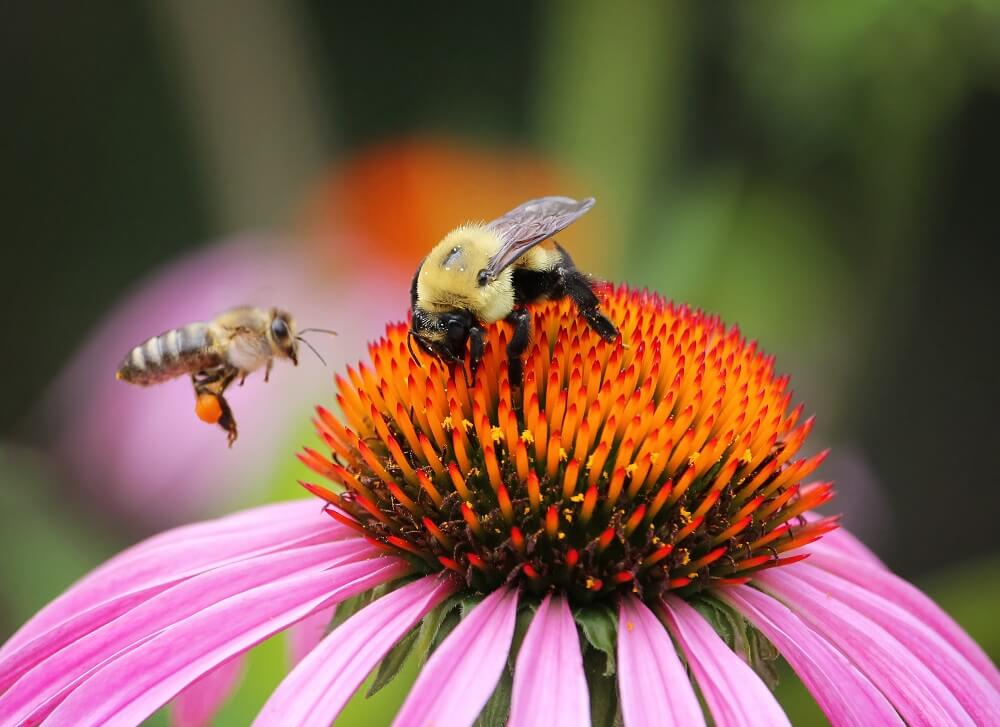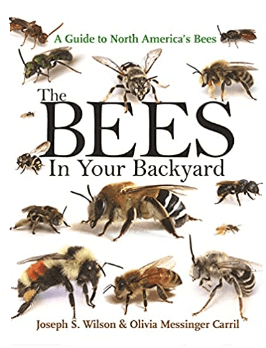Table of Contents:
What Are Digger Bees?
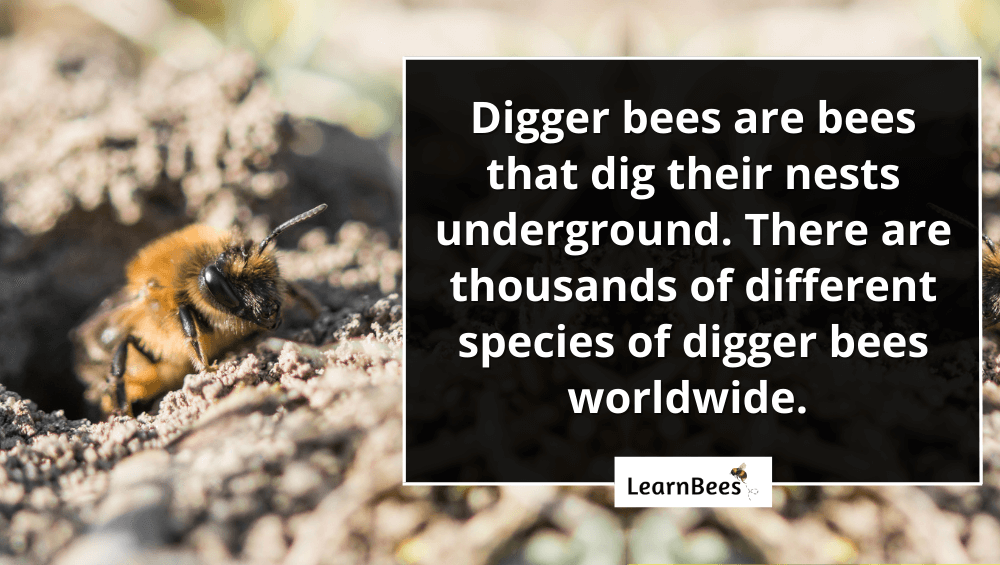
Digger bees, also called ground bees, are bees that dig nests underground.
There are thousands of species of digger bees worldwide. Most digger bees are solitary bees that live alone. Meaning, they’re typically not a part of a colony like social bees are.
And despite popular belief:
Digger bees aren’t harmful to people or their yards. Instead, digger bees are good for your soil because they provide lawn aeration.
What is lawn aeration, you ask?
Simple.
Aeration allows important nutrients, water, sunshine, and air to penetrate the roots of your lawn. This helps your grass grow a healthy, strong root system that is more resistant to weeds.
And to take it a step further?
Professional landscapers recommend aerating your lawn yearly.
But here’s the thing:
The term “digger bee” is broad and refers to many species of digging bees. For example, miner bees, sweat bees, and silvery leafcutter bees all fall into the “digging bee” category.
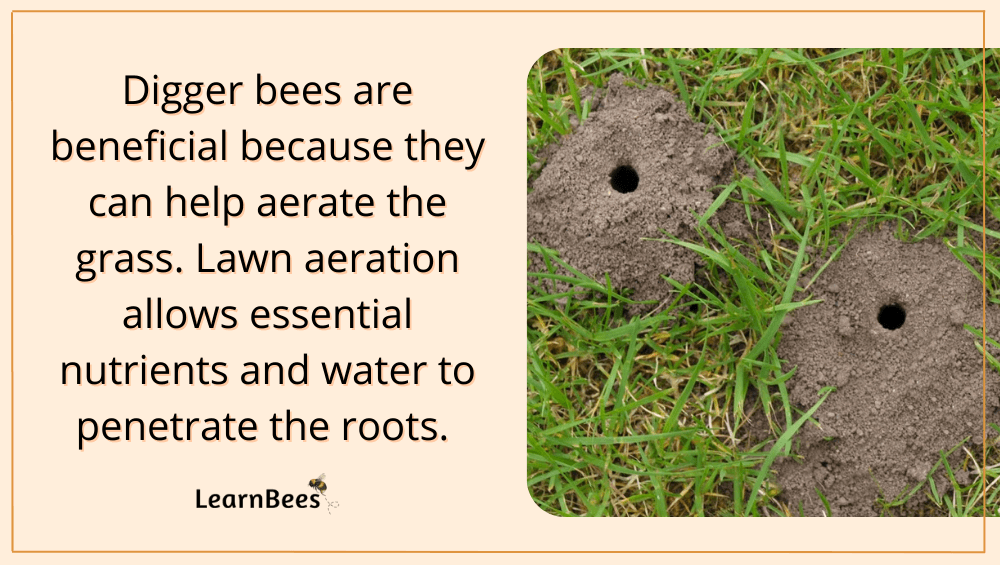
So how do digger bees make their nests?
It starts with the female digger bee. After she emerges from winter hibernation, she mates and digs her nest about six inches into the ground. Next, she stocks the nest with a supply of nectar and pollen so the larvae can eat.
After that?
The bee offspring hatch and then dig their way to the surface. And the cycle repeats, with the new females mating, nesting, and laying eggs.
And here’s the kicker:
Male digger bees don’t help with this project.
They don’t dig the nest, collect food for the larvae, or even offer protection from potential intruders. In fact, male bees don’t even have stingers, so they couldn’t offer protection for the nest even if they wanted to.
Instead, male bees have one very important job:
To mate with a female bee.
That’s it.
And while it may seem like a small job, it’s actually crucial for ensuring the future generation of digger bees.
So now here’s the big question:
Can Digger Bees Sting?
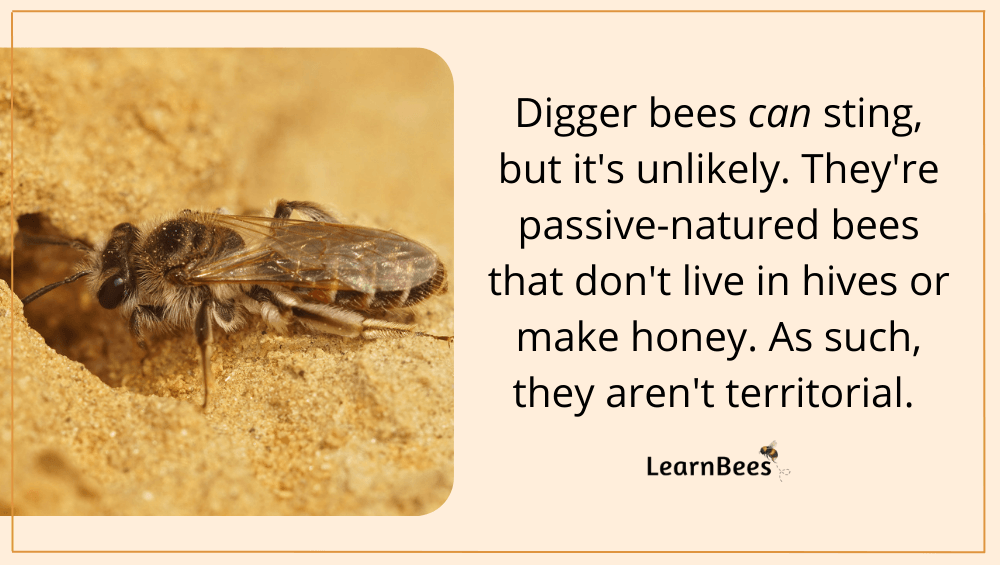
Yes, digger bees can sting.
But is it likely? Not quite.
Remember that most digger bees are solitary bees that live alone. They don’t produce honey or live in a hive full of hundreds of other bees. As a result, they’re not territorial.
Think about it like this:
Honeybees are social bees that live in large colonies of up to 60,000 bees. They can produce up to 100 pounds of honey per year. This means that honeybees are a huge target for predators such as bears, skunks, honey badgers, and other insects.
The same isn’t true for digger bees.
Sure, they have predators like any bee does. But they don’t have to worry about defending a hive or honey.
As such, digger bees are mild-mannered and won’t go out of their way to sting someone.
And keep in mind:
Only female digger bees can sting. Male bees cannot. This is because stingers are modified egg-laying organs, so only female bees have them.
This is true for all bee species, including honeybees, mason bees, and carpenter bees.
Are Digger Bees Beneficial?
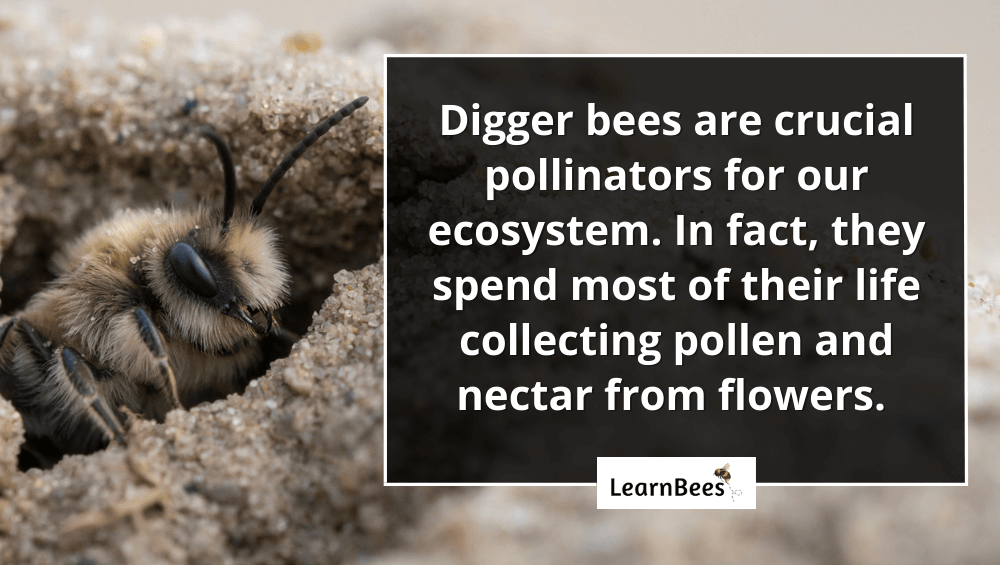
Digger bees are beneficial in more ways than one.
For starters, they’re excellent pollinators that spend most of their life collecting pollen and nectar from flowers. When a digger bee lands on a flower, the hairs on its body collects the pollen grains.
As the bee moves from plant to plant, it leaves a little pollen behind each time. Many plants need this kind of pollen distribution to produce seeds. This is known as cross-pollination.
And the good news?
Pollination is beneficial to both bees and plants.
You see, a bee’s main diet consists of pollen and nectar from flowers. Nectar is their main carbohydrate source, while pollen is their main protein source.
Flowers produce nectar as a way to entice bees to pollinate their flowers. In turn, this cross-pollination allows the plants to produce seeds.
Win-win.
Additionally, digger bees also help aerate your lawn, allowing key nutrients, water, and air to reach the roots.
FAQs on Digger Bees
- How do I get rid of digger bees?
- What causes digger bees?
- Do digger bees produce honey?
- What does a digger bee hole look like?
- Are digger bees aggressive?
- Are digger bees solitary or social?
- Where do digger bees go in the winter?
- Are digger bees actually wasps?
- Are digger bees actually hornets?
- Are digger bees dangerous?
- Are digger bees beneficial?
- Can digger bees sting multiple times?
- What kind of bees live in the ground and sting?
How do I get rid of digger bees?
People often ask, “How do you get rid of bees that burrow in the ground?”
Remember:
Digger bees aren’t harmful to you or your yard. They’re unlikely to sting humans or pets, and they actually help to aerate your lawn. Lawn aeration is the process of making small holes in the ground to allow air, water, and nutrients to reach the roots of the grass.
This is beneficial because it helps improve your lawn’s overall health.
As such, we don’t recommend trying to get rid of digger bees.
That said, the best way to deter digger bees is to have a healthy, thick, and luscious lawn. Digger bees nest where the grass is sparse so they have access to plenty of soil. So if you have patches of dirt in your yard, digger bees are more likely to nest there.
Additionally, there are two tips to discourage digger bees from nesting in your yard:
Tip 1: Water your soil throughout the early spring and summer
Bees don’t like wet soil.
Simply watering your lawn will discourage digger bees from digging in it. And if you notice a lot of digger bees returning to your yard year after year, setting up a sprinkler system can help.
Tip 2: Sprinkle cinnamon over your lawn
Digger bees may enjoy sweet foods, but they don’t like cinnamon.
In general, cinnamon as an insect repellant works like magic. You can get a large container of cinnamon and sprinkle it generously over your lawn. Do this 1-2 times per week during the spring and summer.
And remember:
Try to sprinkle cinnamon before the spring hits so you can discourage the bees before they begin nesting.
However, if spring is here, you may still use cinnamon to entice the bees to relocate.
But that’s not recommended.
It’s better to leave the nests alone and wait till the following year to sprinkle cinnamon. You don’t want to disturb the digger bees too much since they’re important pollinators that we need in our ecosystem.
—> Go back to the FAQs on digger bees
More to Explore:
What causes digger bees?
Digger bees are found in sparse grass areas, such as lawns that get too much shade or not enough water.
That said, you shouldn’t be alarmed by digger bees. They’re gentle bees that are essential pollinators. There is no reason to deter them from your yard. They can safely be around pets and humans because they are unlikely to sting.
—> Go back to the FAQs on digger bees
More to Explore:
Do digger bees produce honey?
No, digger bees don’t produce honey.
They’re solitary bees that only gather nectar and pollen for themselves and their larvae. They hibernate during the winter, so they don’t rely on honey during the cold months like honeybees do.
Honeybees are different.
Honeybees don’t hibernate during the cold months. Instead, they huddle together inside their hive to stay warm. For food, they eat the honey storage they made during the spring and summer.
Once spring emerges, the honeybees leave the hive and start collecting pollen and nectar from flowers again.
But here’s the thing:
Most types of bees are solitary bees that don’t produce honey.
Honeybees are the only species of bee that produces enough honey for human consumption. Bumblebees also produce honey, but only in small amounts.
—> Go back to the FAQs on digger bees
More to Explore:
What does a digger bee hole look like?
It typically looks like small mounds of soil with a hole nearby. The hole is where the bee enters and exits the nest. Digger bees are small, so their holes are small as well.
You’re most likely to see digger bee holes in the spring and summer because that’s when these bees nest. Bees aren’t active during the cold months because they hibernate.
—> Go back to the FAQs on digger bees
More to Explore:
Are digger bees aggressive?
No, digger bees are not aggressive. They’re gentle and unlikely to sting humans or pets. This is because digger bees don’t produce honey or live in a colony with other bees.
But here’s the thing:
Most bees are more gentle than you might think. Bees get a bad rap because they have stingers. That said, most bees won’t mess with you if you leave them alone.
For social bees like honeybees and bumblebees, this means giving them distance away from their hive. Stay at least 15 feet away from their hive to respect their space.
—> Go back to the FAQs on digger bees
More to Explore:
Are digger bees solitary or social?
Digger bees are solitary bees, which means they live alone. Solitary bees are different from social bees like honeybees and bumblebees.
Social bees live in colonies with other bees, while solitary bees live alone. This means that social bees are more likely to sting humans because they’re protecting their hive.
Solitary bees, however, don’t have a hive to protect. They also don’t produce honey. This means they’re more gentle and less likely to sting humans.
—> Go back to the FAQs on digger bees
More to Explore:
Where do digger bees go in the winter?
Digger bees hibernate in the winter. During this time, they’re inactive and don’t collect pollen or nectar.
Bees are cold-blooded creatures, so they can’t regulate their body temperature like humans. This means they can’t be active in the winter because it’s too cold.
Hibernation is a survival tactic for bees. By hibernating, they can conserve their energy and survive the winter months. When spring emerges, they’ll come out of hibernation and collect pollen and nectar again.
—> Go back to the FAQs on digger bees
More to Explore:
Are digger bees actually wasps?
No, digger bees are not wasps. Bees and wasps are two separate species.
More specifically:
There are over 20,000 different species of bees. There are more than 30,000 species of wasps.
Common bee species include:
- Bumblebees
- Honeybees
- Mason bees
- Carpenter bees
- Leafcutter bees
Common wasp species include:
- Paper wasps
- Yellowjacket wasps
- Mud wasps
Additionally, hornets fall underneath the umbrella of wasps. But not all wasps are considered hornets.
—> Go back to the FAQs on digger bees
More to Explore:
- Ground Bees: Are They a Threat to Your Yard?
- Wasps vs. Honeybees: Are They Different?
- Do Bumble Bees Bite?
Are digger bees actually hornets?
No, digger bees are not hornets. Hornets are a type of wasp, while bees are their own separate species.
—> Go back to the FAQs on digger bees
More to Explore:
Are digger bees dangerous?
No, digger bees are unlikely to sting unless they’re threatened. They’ll leave you alone if you don’t grab them or poke your fingers in their holes.
Bees are more likely to sting humans if they’re protecting their hive. This is why social bees like honeybees and bumblebees are more likely to sting humans than solitary bees like digger bees.
So while digger bees aren’t dangerous, it’s still important to be respectful of their space, so they don’t feel like you’re going to hurt them.
—> Go back to the FAQs on digger bees
More to Explore:
- Do Carpenter Bees Pollinate?
- How Long Do Bumble Bees Live?
- Honeybees vs. Bumblebees: How Do They Compare?
Are digger bees beneficial?
“Are digger bees good?” is a common question people ask.
Digger bees are beneficial because they help pollinate plants. Pollination is required for many types of plants to reproduce.
Bees collect pollen on their body as they move from flower to flower. When they land on the next flower, some of the pollen rubs off onto the flower’s pistil. This helps the plant create seeds, which is how the plant reproduces.
—> Go back to the FAQs on digger bees
More to Explore:
Can digger bees sting multiple times?
Yes, female digger bees can sting multiple times. Male bees cannot sting at all.
Unlike honeybees, digger bees have smooth stingers that don’t get lodged into human skin. As such, digger bees don’t lose their stinger after stinging, allowing them to sting many times without dying.
However, digger bees are typically peaceful creatures that don’t sting unless seriously provoked. As long as you don’t poke your fingers in their hole or try to grab the digger bee, then you should be fine.
—> Go back to the FAQs on digger bees
More to Explore:
What kind of bees live in the ground and sting?
These bees are called “ground bees” or “digger bees.” That said, these are umbrella terms that don’t refer to actual species of bees. For example, sweat bees and mining bees are specific species of bees that fall under the “digger” bee category.
—> Go back to the FAQs on digger bees
